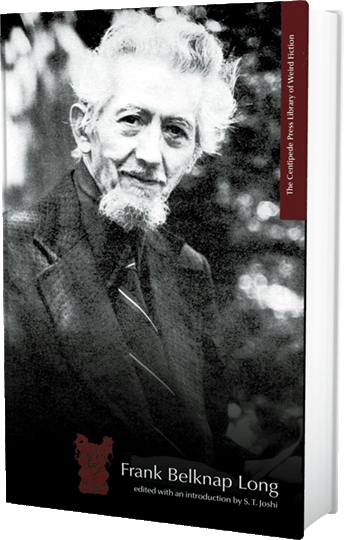Library of Weird Fiction Frank Belknap Long
Frank Belknap Long
SYNOPSIS
As the inexorable custodian to H. P. Lovecraft’s legacy, Frank Belknap Long spent much of his life in the shadow of one of weird fiction’s founding fathers, wearing the burden like an albatross about the neck. Theirs was a bond forged in the underwater caverns of R’lyeh, but unlike Lovecraft, Long was unable to surface a worshipped idol. As such, his name has remained synonymous with the visionary author, leaving Long’s talent as a shape-shifting leviathan underrated and grossly misjudged. But he deserves to stand alone on the merits of his own voice, praised for its menacing and cryptic nature, posing questions of his characters that none can seem to answer.
Although he’s known as an early purveyor to the Cthulhu mythos with stories like “The Eye above the Mantel,” which caught Lovecraft’s attention, Long’s ability can be measured in more than just comparisons to his dear friend. As the crowning achievement among his work, “The Hounds of Tindalos” perpetuates the myth that freeing the mind through hallucinogens will also free the body. No matter the number of liberating doors it opens, it’s bound to let in a few stray fiends. And even though “The Space-Eaters” features Lovecraft himself (fondly named Howard), it contains some of Long’s most indispensably dark humor, paying tribute to the timeless art of story synthesis.
Using the ocean as a setting for misanthropic exploits, Long charted well outside the bounds of human decency. Both “The Ocean Leech” and “Second Night Out” involve sea-faring vessels accosted by merciless demons craving human flesh for no other reason than to bask in the excesses of their own pleasure. Though, their nature can also be an intense psychological probing as found in the “Dark Awakening” and “The Cottage Tenant,” which have an added family dynamic to increase the stakes and immediacy for resolution.
Long also taps into archeological fanaticism, delving into its mysterious past, rife with situations that pin the subject matter on its head. That mystical exoticism can be found in tales like “The Dog-Eared God,” “The Were-Snake,” and “A Visitor from Egypt.” They exercise Long’s penchant for reimagining the history behind coveted treasures that never should have been disturbed. Sacrificial alters, mummified remains, ritualistic voodoo, and deity discussions pockmark these temple walls. But it’s only when the characters fall asleep that the ghouls come out to play.
With scenes and settings hinting toward the subjugated spirits of the past, Long’s stories manifest a gestating revival within his characters. But the forces of evil that may have been long forgotten never really went away. They laid dormant until Long enacted his heathen sorcery and exhumed them from the hallowed grounds where no creature is beyond his grasp. And no character is ever safe.
The volume has been edited by S. T. Joshi, a leading authority on weird fiction. Joshi is the author of The Weird Tale (1990), The Modern Weird Tale (2001), and Unutterable Horror: A History of Supernatural Fiction (2012).
EDITION INFORMATION
- Introduction by S. T. Joshi.
- Massive, 800-page, low-cost edition of Long’s best horror and weird stories.
- Ribbon marker, head and tail bands, full black cloth binding.
- Embossed Frank Belknap Long signature on front board.
- Handsome dustjacket.
- Many photographs of Frank Belknap Long.
- Published May 2022.
- ISBN 978-1-61347-300-9.
- Book size 5½ × 9 inches.
- Number of pages: 808.
| Publisher | Centipede Press |
|---|


